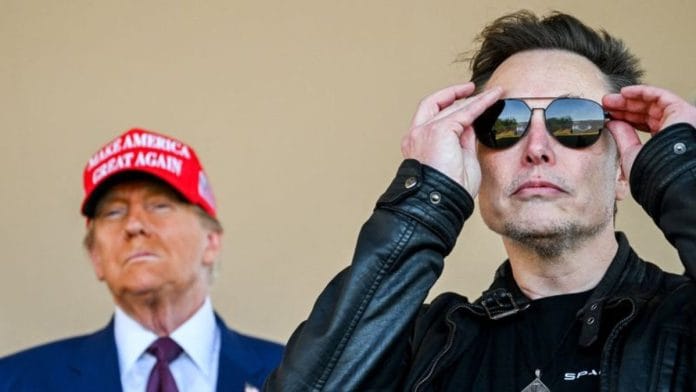A war of words has broken out in the US, pitting ‘Make America Great Again’ or MAGA hardliners like President-elect Donald Trump’s former Chief Strategist Steve Bannon and far-Right political activist Laura Loomer against tech billionaire Elon Musk. The Tesla CEO now occupies a prime seat of power in Trump’s inner circles. Musk and his “tech bros”, including former presidential candidate Vivek Ramaswamy, are under attack for supporting the H1B visa that brings high–skilled immigrants to work, particularly in America’s technology sector.
MAGA supporters have alleged that the visa system brought in lower-wage IT professionals, suppressing the wages of American workers and often replacing them. Loomer launched a frontal attack on Trump’s decision to appoint Indian-American venture capitalist Sriram Krishnan as senior policy adviser on artificial intelligence (AI), later apologising for having ‘accidentally doxxed’ him. The vitriolic verbal attacks and counter-attacks quickly turned critical of Indian Americans, as Democratic Congressman Shri Thanedar too got embroiled in the slugfest.
Trump came out strongly in support of Musk, showing the oversized influence the latter will have on Trump’s White House. This worries the MAGA base significantly more than the issue of the H1B visa or Indian Americans. Perhaps sensing the backlash, Musk later tried limiting the damage, stating that the US visa system is broken and needs to be fixed.
However, the attack on the H1B visa is a red herring. There are two deeper issues. First, there are growing anxieties in America about retaining the competitive edge in the growing US-China competition over new technologies. Second, the Republican Party’s fears of Musk’s influence on Trump and the Party continue to grow.
The great tech game
That there is a growing great power rivalry between the US and China is unmistakable, and it is a comprehensive competition over military and non-military assets. The role of new technologies here is paramount, and it is imperative for the US to maintain its competitive edge in areas like AI and quantum computing.
The Critical Technology Tracker from the Australian Strategic Policy Institute (ASPI) puts China above the US in major areas of future technologies. It has found that China’s global lead extends to 37 out of 44 technologies, spanning defence, space, robotics, energy, environment, biotechnology, AI, advanced materials, and key quantum technology areas. Although contrasting views may exist on the methodologies adopted to reach such conclusions objectively, alarm bells have rung among American agencies. So, where is the linkage between immigration and the new great technological game?
According to a 2023 data analysis, 28 of the top 43 AI companies in the US were co-founded by immigrants, and 70 per cent of full–time graduates in AI–related fields were international students. Even as Ramaswamy got flak for his remarks that the American education system and culture had failed to produce top-class tech recruits—even from Indian-American and former presidential contender Nikki Haley—some questions remain. Who are the next–generation leaders of American tech companies? Where will they come from? How will the Trump team and successive administrations navigate nativist concerns and vocal supporters of the immigrant talent pool?
Also read: Trump’s America will be a challenge. It’s also an opportunity for growing economies like ours
Musk is the real deal
Elon Musk is perhaps the most influential private individual in the US. A glimpse of his potential political impact was seen when he orchestrated a social media war over a bipartisan bill on government spending in the US Congress. Not only is he wealthier than Amazon founder Jeff Bezos and Meta CEO Mark Zuckerberg combined, but he has the kind of access to the White House any private citizen would envy.
Musk reportedly spent more than $250 million this year on Trump’s presidential campaign. With his unmatched financial support and the unabashed use of the ‘X’ microblogging platform, Musk’s rise in the American political landscape has been nothing but meteoric. This is already drawing ire from the MAGA base.
Musk has been a constant presence by Trump’s side while meeting foreign leaders, whether in Trump’s Mar-a-Lago base in Florida or while touring foreign capitals. The billionaire was reportedly present during Trump’s phone call to Ukrainian President Volodymyr Zelenskyy and his meeting with French President Emmanuel Macron in Paris—the first foreign trip since winning the election.
The global presence of Musk’s companies and investments, particularly in China, is already drawing the attention of Republican lawmakers. There is also potential for divergence with Trump’s ‘America First’ strategy and his hardline stance on China.
Multiple US agencies and the outgoing Biden administration have already dubbed China’s comprehensive national power as the most pre-eminent challenge to US global primacy. Trump also made a campaign promise to up the ante on the tariff war with China. There are already several restrictions on Chinese hi–tech products deemed as national security threats.
To what extent Musk’s sizeable business interests in China will influence Trump’s stance toward Beijing remains a moot point. Tesla’s Shanghai Gigafactory accounted for more than half the global sales of Tesla’s electronic vehicles in 2023. Besides commercial interests, Musk’s wealth and influence intertwine with US national defence contracts and national security imperatives through his SpaceX outer space technologies and the Starlink satellite services.
Meanwhile, the Democratic Party seems to be feeding into speculation of a brewing breakup in the Trump-Musk bromance. It is floating new nicknames for Musk such as “co-president” and “shadow president”, feeding into Trump’s well-known vanity of not wanting to see anyone overshadow him.
However, the long-term impact of private citizens like Musk on national governance is something the US political class would have to brace for.
Monish Tourangbam is Director at the Kalinga Institute of Indo-Pacific Studies (KIIPS), India. Views are personal.
(Edited by Prasanna Bachchhav)






